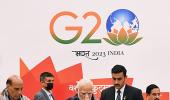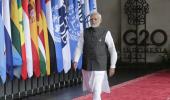India's role as a leader of the global south may require it to give up its ambition to serve as a bridge between the warring halves of the international community, points out Mihir S Sharma.

Unlike in previous presidencies, when the final G20 summit was held towards the end of the year, this year India has chosen to hold the leaders' meeting in early September, weeks before the United Nations General Assembly normally kicks off the summit season.
Whatever the reason for this shift, it means that India's presidency always had a tougher task than others to move the needle on crucial policy issues.
Second, the geopolitical situation has deteriorated markedly since a tentative agreement was obtained at the last G20 summit held in Bali last November.
A joint communique with acceptable language about the war in Europe could be issued after that summit -- thanks in part to the diplomatic efforts of the Indian delegation -- but there are real fears that this achievement will not be matched in New Delhi.
Several previous meetings earlier this year have ended not with a joint communique. but with a statement by the chair.
Indian officials find this relatively comforting in a way -- they can ensure that India's priorities get some visibility.
But the sustained efforts to achieve a consensus on wording to describe the Russian Federation's war of choice in Ukraine have drained away energy and distracted Indian policy makers.
Various other parallel efforts have also taken away attention from the G20 process.
Some finance ministers did not attend the Ahmedabad summit in July, for example, because they had turned up in June to a big conference called by French President Emmanuel Macron with the aim of 'reforming the international financial system'.
Such reform is, in fact, supposed to be the core competence of the G20.
But while the issues at stake in both the G20 and Paris processes are the same -- from sovereign debt to financing poor countries' adaptation to climate change -- the participants and their priorities are different.
It should not entirely surprise us if a multiplicity of efforts does not result in greater movement.
On sovereign debt, for example -- which the Indian government has declared is reaching crisis levels in many developing countries, including in our own neighbourhood -- the G20's efforts have not panned out as expected.
Special mechanisms to help indebted countries have gone unused in some cases because developing countries fear they might be a bad signal that locks them out of private capital markets.
The structural problem slowing down debt resolution is deeper, however.
Nobody is certain how to deal with the emergence of the People's Republic of China as a major creditor to developing countries.
It seems that Beijing has neither the know-how, nor the capacity, nor apparently even the will to enter into clear and transparent mechanisms similar to those utilised by other sovereign creditors.
This has slowed down the G20 reform process.
And what has not helped here is that at the Paris conference China agreed to a side deal to restructure one particular country's debt -- Zambia's.
While that deeply stressed southern African economy clearly needed assistance, the fact is also that such case-by-case arbitrariness takes the pressure off efforts to find a solution that can be applied across the board and end concerns about a generalised sovereign debt crisis.
Reform of multilateral development banks (MDBs) such as the World Bank is another issue on which the G20 and other efforts are not running in parallel.
At the Paris conference, Ms Sitharaman was very clear that India does not believe in burdening the existing development institutions with additional mandates.
But many other participants at Paris wished to use the MDBs' assets to address problems, such as adaptation to climate change, that have not traditionally been central to their lending.
This does not mean, of course, that India should give up on efforts to utilise its G20 presidency to make a real change to how development priorities are financed at the global level.
Recent work on putting the MDBs' capital to better use, which was commissioned some years ago and presented to the Indonesian presidency last year, is one easy win for India.
However, India should also demand that this shift be accompanied by a wholesale transformation of the MDBs institutionally, particularly the World Bank.
The new head of that institution has deep experience of both the private sector and India's development priorities, and that should be leveraged.
More broadly, Indian decision-makers cannot at this stage focus all their efforts on an elusive broad consensus.
Instead, a narrower focus on India's specific priorities -- from investment to global financial reform to interlinking digital public infrastructure -- will be needed.
The government will need to be agile in restructuring, at this relatively late date, their efforts and narrowing the possible achievements for their presidency down to two or three items.
This would nevertheless be hugely consequential, especially if these items are designed to appeal also to Brazil and South Africa, the next hosts.
India's role as a leader of the global south may require it to give up its ambition to serve as a bridge between the warring halves of the international community.
If so, that is a trade worth making.
Mihir S Sharma is director, Centre for the Economy and Growth, Observer Research Foundation, New Delhi
Feature Presentation: Aslam Hunani/Rediff.com












 © 2025
© 2025